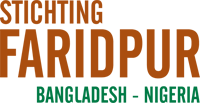Plastic Surgery Camp and visit Children’s Home January 2011 (Bangladesh)
Report Jeltje Doeleman
Members of the team:
Cees Spronk, leader of the team and plastic surgeon
Paul Spauwen, professor plastic surgery and his wife Elizabeth Spauwen
Corien van Rijswijk, anesthesiologist
Rita Witteveen, assistant anesthesiologist
Alex Salomon, ophthalmologist in Vienna
Neeltje Spronk and Jeltje Doeleman of the Faridpur foundation
Sunday 9 January we arrived at three am in Dhaka. After waiting for a long time for our baggage we were welcomed by Shamim Haque and some relatives. By bus we went to Shamim’s house where we had a delicious lunch. Then we travelled to Faridpur. As it was my first time in the tropics the traffic scared me, but after some time I got used to it. After four hours we arrived in Faridpur and went to the guesthouse where we would stay for two weeks.
Early next morning we went to the hospital, where we were given tea, biscuits and a nice bunch of flowers. Then we screened the patients. Dr Spronk mainly saw children and some adults with scars caused by burns resulting in serious contractures. Some patients could no longer close their mouths or eyes because of the scars. Prof. Spauwen treated split lips and palates.
Dr. Salomon and Elisabeth stayed in the eye-hospital, where patients were screened with cataract, in which dr. Salomon is specialized. We had some initial difficulties which was to be expected. The doctors of the hospital had to get used to us. We had to find out how people work here, the functions of the devices and how they deal with hygiene.
Meanwhile Neeltje and I visted the children’s home. When we passed the gate we entered an oasis after the poverty we had seen on our way. The buildings are tasteful and the terrain with flowers and trees is clean. We were cordially welcomed by the manager Manik, the accountant and his assistant.
Then we examined the terrain. We saw the new, simple kitchen, sponsored by the Rotary Club Oosterbeek and the school. It has six classrooms and a playground with play sets donated by Mike and Simone Blesma. We also saw a housing unit with a central room, laundry room and bedrooms. The children looked healthy and vivacious. The terrain also has a fishing pond, a kitchen garden, some cows, chickens and fruit trees. The products are used for the children’s food.
Later that week we had a meeting about a boys’ home. We also had a cultural afternoon for the children with a band of blind musicians.
I had not expected the cold and the dense fog resulting in dripping trees with temperatures of 10 degrees night and day. Several homeless people, probably without warm clothes, died of the cold.
Some other relevant matters: the medical team worked all days except Fridays, which is the day off in Muslim countries. We did 200 successful operations on 175 patients. In the operation theatres doctors teach students. Dr. Paul, a Bengal doctor who has worked for the Plastic Surgery Camp for years, also teaches the Bengal doctors.
The doctors gave a lecture on a medical symposium. Neeltje and I visited a brickworks and went to a traditional wedding party. We were also invited by Shamim, his Hindu business partner and the principal of the University. Each day we had lunch and coffee with Rontu, Shamim’s brother and his wife Nahar.
On Friday 20 January we went back to Dhaka for some shopping. Then we went to Shamim’s house for supper. The next morning we left early to the airport on our way home with many unforgettable impressions.
Jeltje Doeleman

